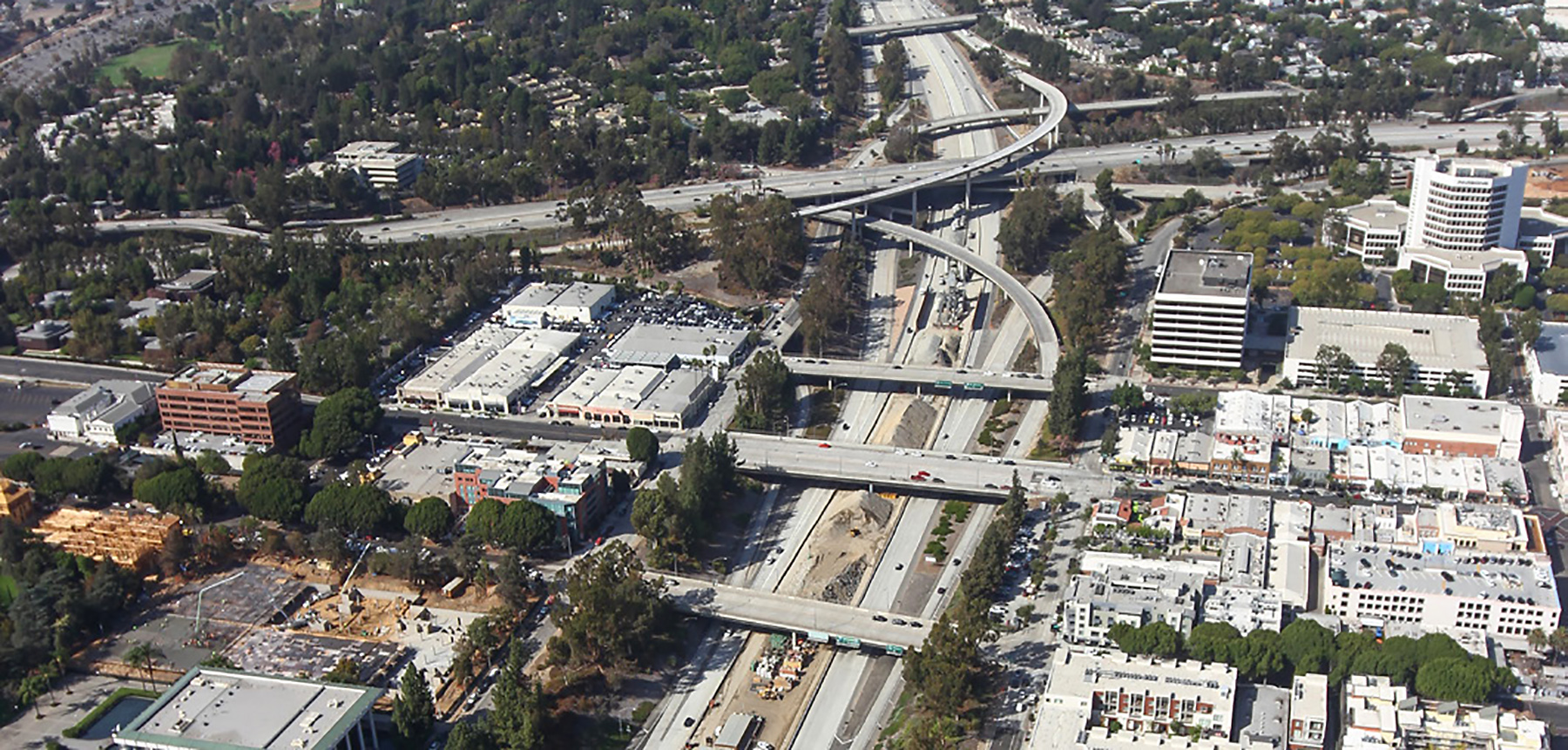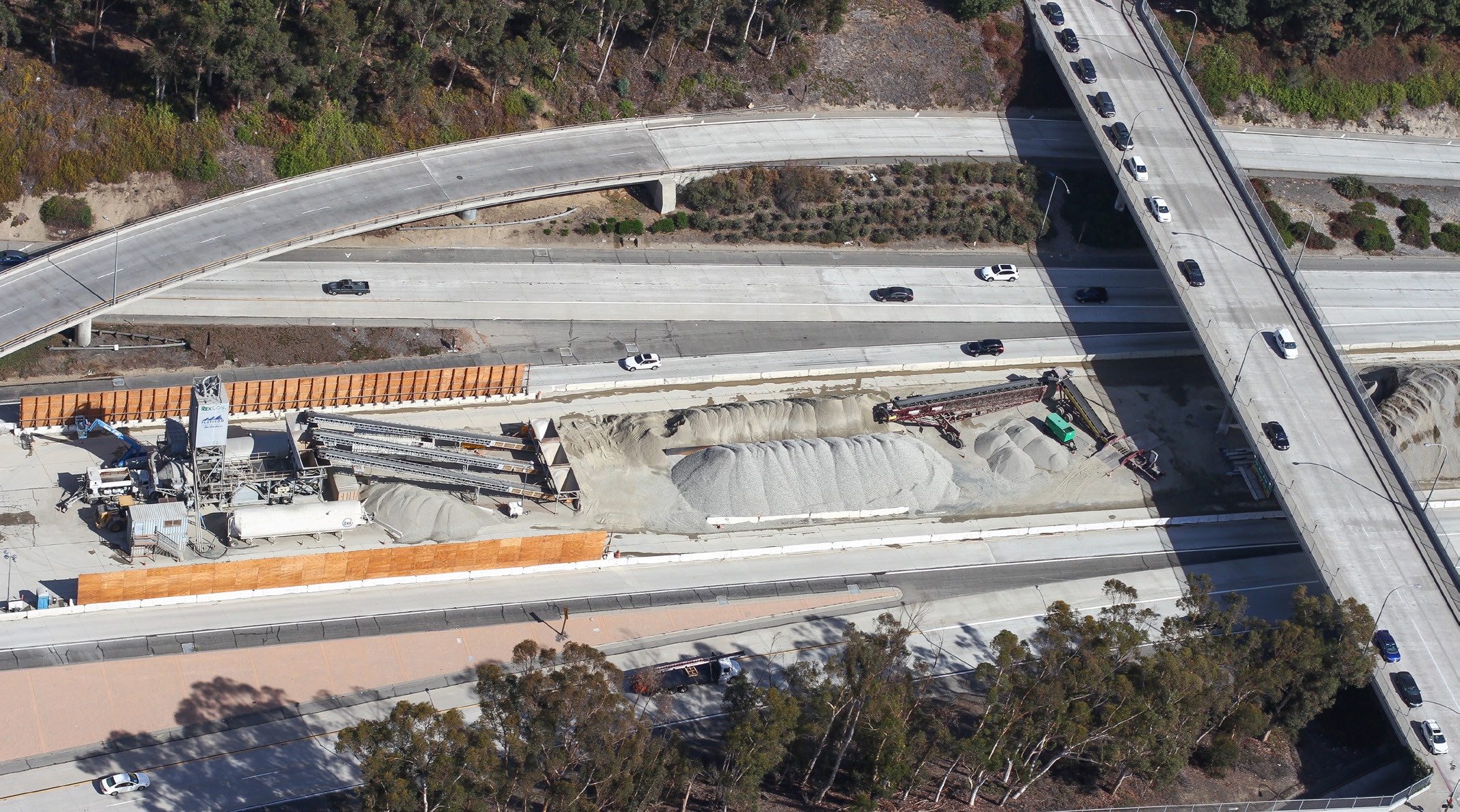And does it sustainably by recycling more than 100,000 tons of pavement
By Charles Stuart & Mark Gudenas
Anyone who has ever traveled in Los Angeles County knows the importance of the route of Interstate 210 between Los Angeles and Pasadena. And the traffic.
Hundreds of businesses lie along the 9.7-mile route – hotels, restaurants, markets, shops, gas stations, and commercial parks, along with schools, churches, hospitals, museums, the Jet Propulsion Lab, the Rose Bowl stadium, and the iconic annual Tournament of Roses Parade.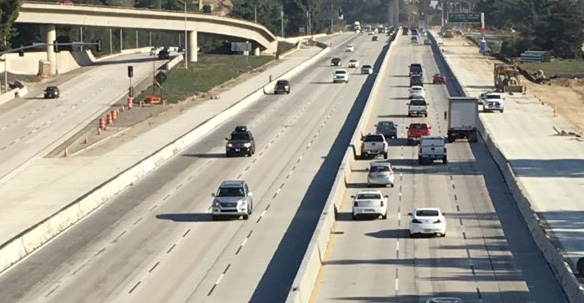
Awarded by the California Department of Transportation (Caltrans) to Flatiron West, the four-year, $126-million project removed and replaced approximately 400,000 square yards (SY) of pavement slabs, replaced approach slabs at 16 bridges, and completed more than 900,000 SY of diamond grinding along 9.7 centerline miles of I-210.
To extend the pavement life, improve traffic operations, and enhance safety in this congested urban area of Los Angeles County, Flatiron West rehabilitated 77 lane miles of distressed pavement sections that were in poor condition due to heavy traffic loading. The project also encompassed the installation of enhanced roadway elements, improved lighting and electrical systems, and new signage.
The vibrant communities within the project boundaries take immense pride in the appearance of their cities, and the value of mobility. To that end, Flatiron and Caltrans proactively monitored construction to enhance safety, maintain access, maximize the aesthetic appearance, and minimize disruptions throughout the project.
Keeping the Tournament of Roses Parade Rolling
The team partnered with Rose Parade officials in Pasadena to ensure that each of the three annual parades that took place during the construction schedule were unaffected. With an average of more than 700,000 attendees each year, the team expedited ramp construction and reduced ramp closure days by 30 percent. This and other efforts created a culture of collaboration and trust, which resulted in Caltrans and Flatiron West being commended with three Gold Caltrans Success in Motion Awards, the 2020 AGC California Constructor Award, and national recognition by ENR.
This true partnership found the most cost-effective approach to optimize life-cycle costs, enhance the project scope, and improve the project’s overall quality. All throughout the project, the team identified opportunities to improve constructability and quality while saving money by optimizing designs or adjusting the construction approach.
Innovation Yielded Great Results
Flatiron constructed 11 types of pavement, some experimental, which included precast jointed plain concrete, two-lift composite pavement, continuously reinforced concrete pavement (CRCP), and jointed plain concrete pavement (JPCP) in the full reconstruction of lanes 3 and 4, and reconstruction of lanes 1 and 2, as needed, using slab replacement.
Notably, this project was one of the most 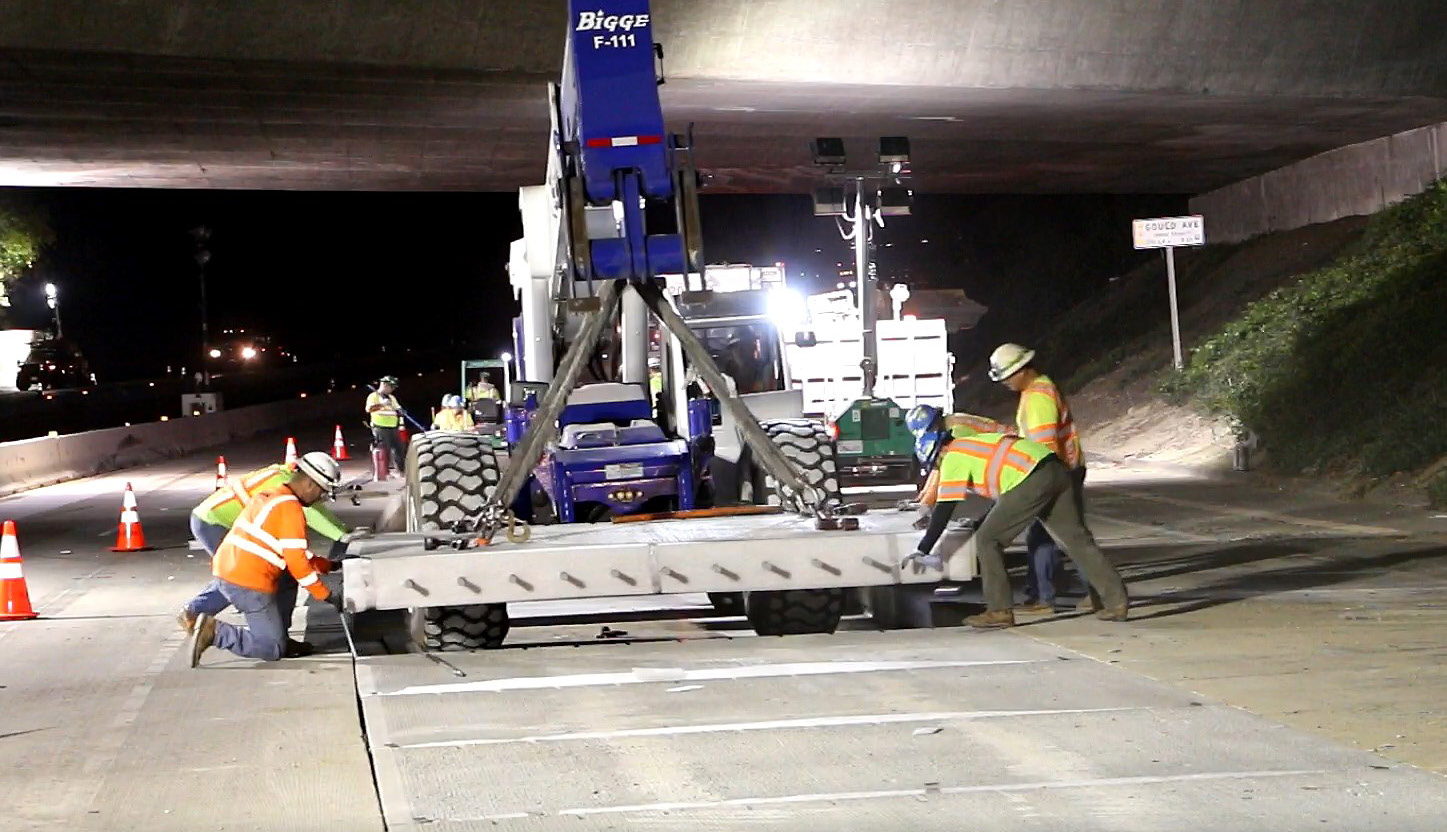 significant uses of precast highway pavement slabs in the United States. Precast panels were installed for approximately 11 lane miles of the rehabilitation project to minimize traffic disruptions to the traveling public in this congested, urban area. Working with a carefully planned overnight schedule, the 4,900 panels of 12.5-foot-wide by 11.33-foot-long by one-foot-thick precast concrete were installed nightly, allowing the lanes to be reopened to traffic before the morning commute.
significant uses of precast highway pavement slabs in the United States. Precast panels were installed for approximately 11 lane miles of the rehabilitation project to minimize traffic disruptions to the traveling public in this congested, urban area. Working with a carefully planned overnight schedule, the 4,900 panels of 12.5-foot-wide by 11.33-foot-long by one-foot-thick precast concrete were installed nightly, allowing the lanes to be reopened to traffic before the morning commute.
Flatiron and Caltrans collaborated to develop a viable longitudinal load transfer connection that was used in the fabrication and installation of the precast concrete panels. Based on the design success of the panel connection, this may become the design standard for future Caltrans projects.
As a result of this innovation, the project received the 2017 American Concrete Institute Southern California Chapter Charles J. Pankow, Jr. Award in Recognition of Outstanding and Innovative Uses of Concrete in Construction for the use of the precast slabs.
Flatiron and Caltrans partnered with the Federal Highway Administration, as part of the second Strategic Highway Research Program (SHRP2) Project R21, to install one mile of two-lift composite pavement system using recycled pavement on Eastbound I-210. This marks the first use of this pavement system in the United States.
Sustainability, Reuse & Zero-Waste
Caltrans and Flatiron coordinated with the City of Pasadena to set up an onsite concrete batch plant and crushing facility to recycle concrete as an aggregate source for lean concrete base (LCB). This minimized impacts to the environment by eliminating the need for transit mix trucks for LCB, reducing hauling through city streets, and delivering less material to the landfill.
More than 100,000 tons of existing pavement was recycled back into the project. Flatiron confirmed the R-value of the in-situ material was adequate and gained approval to eliminate import of Class 3 Aggregate Base for this paving. This sustainable practice eliminated the need for 54,000 tons of imported base and subsequently eliminated the GHG emissions that would have resulted from trucking 3,000 loads of material. The cost savings of more than $750,000 generated by this change was used for additional panel replacements in the project.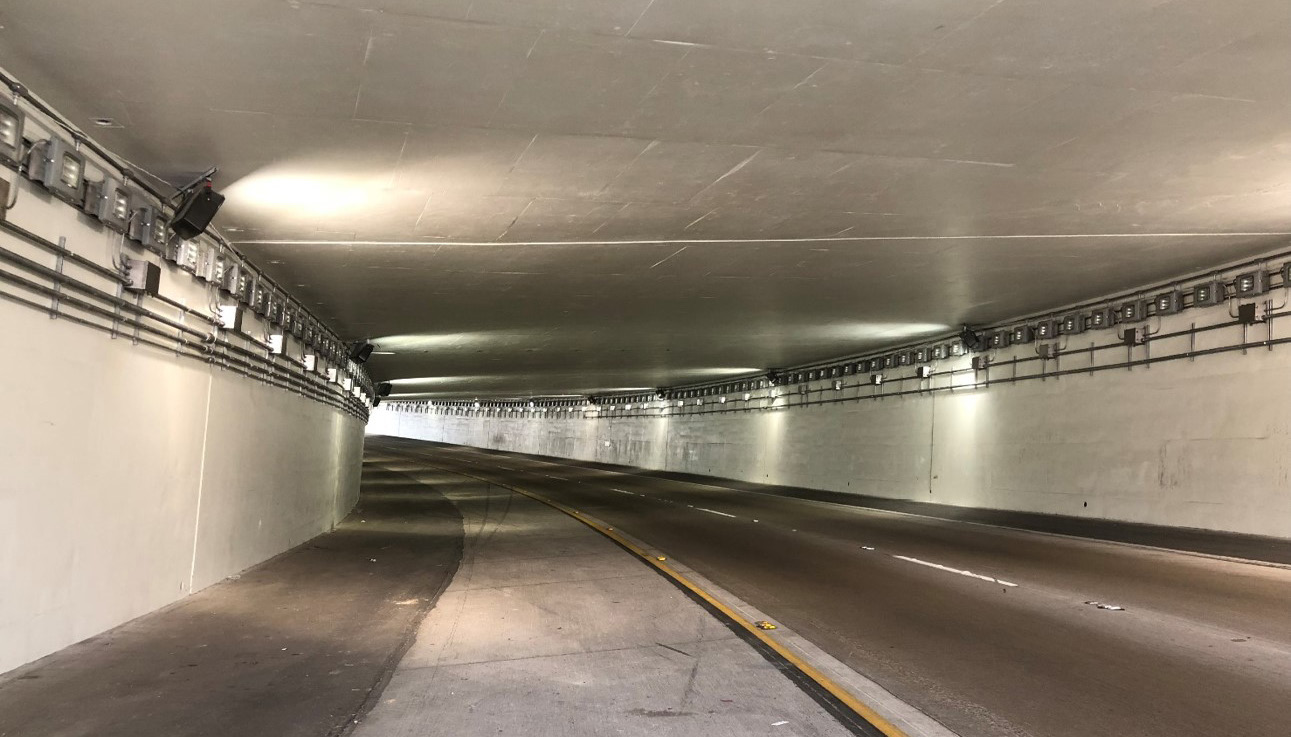
Lighting the Way and Reducing Energy Consumption
The project replaced conventional lighting with light-emitting diode fixtures in three tunnels. That totaled 1,700 linear feet. The new fixtures will reduce energy consumption by 50% to 60% and reduce maintenance costs.
Safety
Flatiron’s commitment to their employees, team members, and the general public was reflected daily in the team’s approach to safety, which included close compliance to regulatory requirements, in-house training, and monthly safety policy reviews, all resulting in industry-wide best practices. The team did an excellent job protecting the workforce in a very hazardous environment, working both day and night for almost four years, often exposed to live traffic – especially at night – on one of the busiest freeways in Southern California; all without experiencing any major injuries.
Project Team members included: Sushilkumar Chaudhari, P.E. and Andy Liao from Caltrans; George Butorovich from Flatiron; Francisco Rivera from Cemex; Ron Meskis from Simplex; and Slawek Dymerski from RMA.
The companies and organizations involved in this project include Flatiron West, Caltrans, CalPortland, CC Products, Cemex, Cooper Engineering, GOMACO, Harber Companies, National Ready Mix, Oldcastle, Pavement Recycling Systems, RMA Group, RexCon, Sika, and Simplex.
Gold Award
Interstate 210 Highway Rehabilitation Project
Los Angeles County, CA
Contractor: Flatiron West, Inc.
Owner: California Department of Transportation
Engineer: Caltrans


